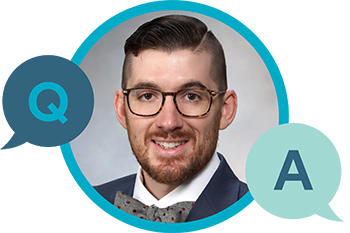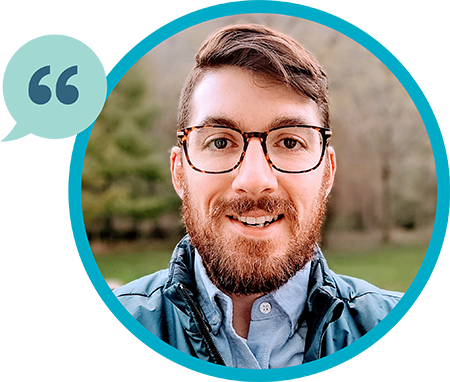
I’m Zach Thompson, MD, FCAP, CABP. I am a senior associate consultant at Mayo Clinic Jacksonville where I serve as the medical director of the human cell therapy lab. I also hold an appointment as an assistant professor of laboratory medicine and pathology at Mayo Clinic College of Medicine and Science. My professional training is in anatomic and clinical pathology, with subspecialty training in transfusion medicine, blood banking, and cell therapy. My primary responsibility in my current role is directing our conventional cell therapy processing lab as well as externally manufactured commercial and clinical trial novel cell therapy products.
I was drawn into biotherapies through my interest in apheresis and stem cell transplantation. As a transfusion medicine pathologist, I have frequently managed care for bone marrow transplantation patients through the pretransplant and post-transplant pipeline. It bothered me that the apheresis products we collected disappeared within the “black box” of the cell processing lab. I originally sought subspecialty training within biotherapies to close this gap and become a “full-service” cell therapy pathologist – from the beginning to the end of a patient going through the transplant process. One of the most rewarding parts of my job is expanding access to novel cell therapies by partnering with external sponsors to bring research products to my local patients who would otherwise not have access to these novel treatments.
I was encouraged to engage with AABB on social media by my mentor and friend, Justin Kreuter, MD, during my rotation with him in 2018. At that time, I was mostly lurking online and digesting the educational content from other members of the #blooducation community on X (formerly known as Twitter). When I joined the Mayo family in 2020 during the height of the COVID-19 pandemic, I decided to selfishly “lean in” to using social media as a tool for staying focused on my education. I tried to tweet something I learned each day as a way of reflecting on the day to cement my learning. This was especially true during the virtual AABB Annual Meeting. I decided to live-tweet the meeting to help focus my attention rather than passively observing the presentations. I was fortunate that this engagement introduced me to so many great mentors and friends within AABB and the #blooducation community. Since then, I’ve been fortunate to participate in subsequent Annual Meetings, subsections, and online discussions to expand the conversation within blood and biotherapies.

The goal of obtaining this certification has expanded over time. Originally, I wanted to test myself after my cell therapy fellowship. My professional pipeline has allowed me to demonstrate my competency with board certification in anatomic pathology, clinical pathology, and transfusion medicine/blood banking. Unfortunately, cell therapy is not currently recognized by the ACGME as a supported fellowship, so I had no metric by which to judge my competence. Given this, I thought the CABP exam and certification could help prove that my fellowship training had accomplished its purpose. Having obtained the certification, the importance has grown as I’ve been plugged into this network of peers. I know I can lean on and leverage the experience of other CABPs to fill gaps in my knowledge, collaborate to close gaps in our practice, and ultimately, improve the outcomes of our patients.
Carrying a CABP certification helps to solidify that we are all operating with a similar level of knowledge and speaking the same biotherapies “language.” Biotherapies are expanding at a rate far beyond what any single individual can grasp, and so, we as biotherapies developers and practitioners need to find an ongoing way to test our knowledge to stay current within the field. I hope this serves two goals. One is that, as the field changes, we can keep up with the fundamental knowledge needed to maintain our flexibility and agility to meet new challenges. Two is that with this iterative practice, we can drive towards standardization in the field to better compare novel cell therapies and their effectiveness in patients.

I would hope that as many early-career professionals as possible pursue this certification. I am specifically looking at pathologists and other physicians who seek to bring these investigational biotherapies to the bedside. Many of us are comfortable with the medical aspects of patient care but lack fundamental knowledge in product development, the regulatory environment and quality system essentials, which are critical for these products to reach prime time. Having this certification in place to form a union between product development, safety systems, and clinical practice builds a space for us all to understand the different aspects which we independently contribute to this diverse field.
I am most excited to expand access to conventional and novel biotherapies for nonmalignant indications to patients within my local area. A particular area of focus for us is to onboard clinical trial CAR-T products for rheumatologic and autoimmune disease. Additionally, there have been several exciting advancements in treatment for sickle cell disease and transfusion-dependent thalassemia that I hope to see prescribed to our patients early next year.

Becoming a CABP is a mark of distinction, establishing that qualified professionals have demonstrated – through a certification exam – that they have the necessary knowledge to credibly practice in the field of biotherapies.